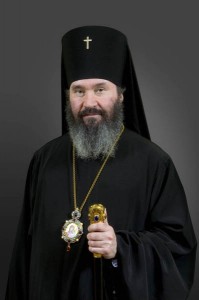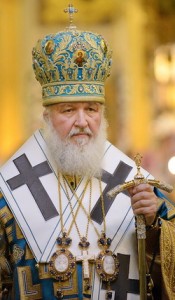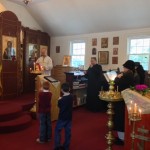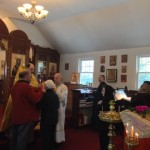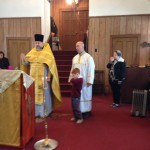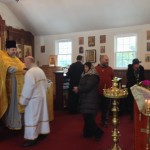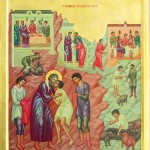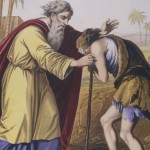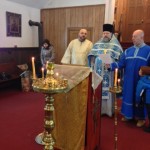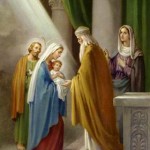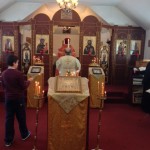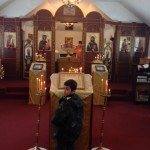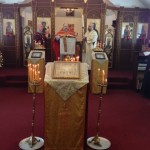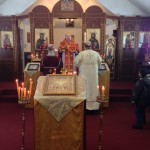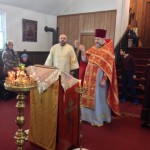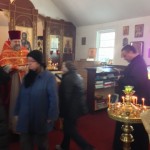On February 23, on the Meatfare Sunday our parish had a liturgical celebration in the temple. Following the readings from the Sacred Scripture St. George’s Rector, Archpriest Igor Tarasov preached a homily:
“Today, on the Meatfare Sunday we commemorate the Last Judgment. Usually, in our Church celebrations we commemorate something which took place in the past. But today we commemorate an event which is going to happen in the future, at the end of the world. Today we remember the Day of the Last Judgment of the Lord. You heard about that event in today’s Gospel lesson.”
“In today’s Epistle lesson St. Paul is raising an issue that should concern all true believers in Christ. He warns us not to be “a stumbling block to the weak” (1 Cor. 8, 9). This has always been one of the greatest challenges of Christians: to make certain that no one stumbles because of us, to make sure that no one is tempted to sin because the faith we profess with our lips is different from the faith we practice.”
“At the time of St. Paul the marketplace in Corinth was flooded with meat that had been sacrificed to idols. One party of intelligent Christians believed that since the idols or false gods to whom this meat was sacrificed did not even exist, there was nothing wrong in buying the meat for use at home, or eating it in a public place. The weak Christians, however, who had just been converted from paganism, were scandalized by this. They felt that the meat was given over to the demons, and the demons somehow took possession of it. If they ate this meat, the demons would somehow gain entrance into their bodies. This is why St. Paul advises not to wound the conscience of those who are weak. He instructs the intelligent Christians of Corinth saying, “Beware lest somehow this liberty of yours become a stumbling block to those who are weak” (1 Cor. 8, 9). He goes on and warns that because of their knowledge the weak brother, for whom Christ died, may perish (1 Cor. 8, 11). St. Paul goes even so far as to say, “If food makes my brother stumble, I will never again eat meat, lest I make my brother stumble” (1 Cor. 8, 13).”
“These advices of St. Paul teach us that the one who is more knowledgeable and intelligent should yield to the one who is less educated or weak. The Apostle suggests that we should act lovingly towards each other and should not use our greater insight to do violence to people who may know less. It is a sin to ruin the life of another. It is terrible to learn to sin. It is disastrous to teach another, to lead or cause him to sin. If anyone causes another to sin, said Jesus, “it would be better for him that a millstone were hanged about his neck and he were drowned in the depth of the sea” (Lk. 17, 2).”
“Dear brothers and sisters! All of us should always remember that no one lives unto himself. We are all bound together. Today’s Gospel is reminding us that at the end of the world we all are going to be judged together by the Lord. All our deeds will be exposed to others. Thus, when we act, especially when we do anything in public, we must consider others. When we fall, it is not an isolated fall, but the whole Church of God falls with us. We are all bound together in the one Body of Christ. Thus, we must consider our weaker brothers or sisters for whom Christ died.”
“Unfortunately, sometimes we act with no such consideration of our weak brothers and sisters. It seems that many more people would follow Christianity if some Christians were not stumbling block for them. For instance, Gandhi, the great leader of the Indian nation was inclined to become a Christian when he was young. He believed that Christianity held the right answer to India’s grave problems and could heal Indian society from the wicked caste system. But one Sunday Gandhi went to a Christian church. An usher coldly confronted him at the door and said, “Sir, this church is only for Europeans”. Deeply disillusioned, Gandhi that day walked away from that church and from Christianity. How different India’s history might have been if a different attitude, a likeness of Christ was shown by that church usher! Instead of being a welcoming apostle of Christ, this man turned out to be a great stumbling block.”
“Similar things sometimes occur also in our Orthodox parishes. Much more people could attend the temple and belong to the Orthodox Church if we, Orthodox Christians did not become stumbling block to them. We hear that sometimes our faithful show their great zeal by rebuking or reprimanding the people who come to the church having very little or no knowledge of how to behave in the temple. Instead of welcoming them and having patience to explain how they should dress, behave and participate in our services, some overzealous parishioners chase them away. This may not happen in our parish or in the close parishes, but we hear that it does happen somewhere, especially in the old country. Again, our deeper knowledge of the Church life and our greater spiritual experience should not become a stumbling block to those who are weak and less experienced in those matters.”
“Dear brothers and sisters! Let us not be a stumbling block to our weak brethren. But let us also go beyond this. Let us be an inspiration to someone. Yes, not being a stumbling block is very important. But it is too negative. Let us be also an inspiration to those who are weak. Our Lord said to His disciples: “Let your light so shine before men, that they may see your good works and glorify your Father in heaven” (Mt. 5, 16). All of us, if we desire to stand at the right hand of our Lord at the Last Judgment, should live in such a way that our light may shine before men. We are called to live a Christian life, a life blessed and assisted by divine grace, a life of prayer and good works. We are called not to be a cause of scandal, a stumbling block to others. But to bear a light shining to other men and inspiring them to be with Christ now, at this age, and to also stand at His right hand at the end of time, and to reign with Him in the eternity.”
Due to the great concern for the situation in Ukraine special petitions for the multiplying of love and for the eradication of discord and hatred were added to the usual Litany of fervent supplication of the Liturgy.
A Litany for the deceased was also offered during the Divine Liturgy because our parish did not have any service for the departed on the Memorial Meatfare Saturday. Along with usual commemoration of all Orthodox Christians we commemorated the souls of those who were killed during the strife in Ukraine.
At the end of the Liturgy Fr. Igor offered a special prayer for the Ukrainian people and for the pacification in Ukraine.
Following the Liturgy dismissal the Rector read the Letter from His Holiness, Patriarch Kirill calling for a fervent prayer for the multiplication of love on the lands of Ukraine. The Rector also advised the parishioners that His Eminence, Archbishop Justinian also issued a special letter about this issue. The Archbishop’s archpastoral recommendation to all of us in the Patriarchal Parishes is to abstain from any political discussion in the temple and to limit our mentioning of Ukraine to our fervent prayers.
After the Divine Liturgy the Rector performed a Memorial service which included commemoration of all Orthodox Christians, the victims of the strife in Ukraine and also the deceased relatives of the Kay family that requested such commemoration.
Our celebration was concluded by the coffee hour at which the Rector and parishioners enjoyed delicious meals and a nice company.

